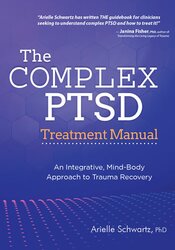Somatic Psychology in the Treatment of Complex PTSD
Attending to Areas of Numbness or Disconnection

Somatic psychology invites us as therapists to notice our own bodies and to observe our client’s nonverbal communications for signals of safety or threat. For example, our bodies respond differently depending on whether we feel safe or threatened. Under conditions of safety, we feel relaxed, but under conditions of threat, we react instinctively out of self-defense. A body-centered approach emphasizes the importance of paying attention to these changes in facial expressions, postures, gestures, and tone of voice as a core part of therapy.
Somatic psychology recognizes that our difficult life experiences, especially those from early development, contribute to patterns of tension in the body. Importantly, body awareness helps us access an internal source of wisdom that guides the healing process for complex PTSD (C-PTSD). However, we must engage clients in body awareness and healing movements at a pace they can tolerate. We achieve this by strengthening their capacity for dual awareness, in which they remain aware of their external senses while building their capacity to internally sense and feel the body.
Building body awareness can be uncomfortable at first. Clients may have difficulty staying present with their sensations. They may feel restless, anxious, and irritable, or they might feel lethargic, tired, and heavy. In some cases, clients may report feeling numb or disconnected from their sensations. This is especially common for clients with dissociative symptoms.
When working with clients who have difficulty connecting to their body, explore the following healing practice from my new book, The Complex PTSD Treatment Manual, to help them connect to sensations and emotions at a pace that they can tolerate. You can use these statements to invite somatic awareness of areas of tension, numbness, or pain as you and your client discuss traumatic events from their history. Not all statements will be relevant to all situations, so adapt these as appropriate to your client.
Click here to download your free copy of the Repattern the Body exercise.
You can find more information on how to conduct successful therapy with clients who have experienced prolonged exposure to traumatic events in The Complex PTSD Treatment Manual: An Integrative, Mind-Body Approach to Trauma Recovery.
*This is an adapted excerpt from The Complex PTSD Treatment Manual by Arielle Schwartz, PhD. Copyright © 2021, Arielle Schwartz. PESI Publishing.
Learn more about treating complex trauma in Dr. Arielle Schwartz’s other blog posts: Attending to Dissociative Symptoms with Parts Work Therapy and Connection & Co-Regulation.
Somatic psychology recognizes that our difficult life experiences, especially those from early development, contribute to patterns of tension in the body. Importantly, body awareness helps us access an internal source of wisdom that guides the healing process for complex PTSD (C-PTSD). However, we must engage clients in body awareness and healing movements at a pace they can tolerate. We achieve this by strengthening their capacity for dual awareness, in which they remain aware of their external senses while building their capacity to internally sense and feel the body.
Building body awareness can be uncomfortable at first. Clients may have difficulty staying present with their sensations. They may feel restless, anxious, and irritable, or they might feel lethargic, tired, and heavy. In some cases, clients may report feeling numb or disconnected from their sensations. This is especially common for clients with dissociative symptoms.
When working with clients who have difficulty connecting to their body, explore the following healing practice from my new book, The Complex PTSD Treatment Manual, to help them connect to sensations and emotions at a pace that they can tolerate. You can use these statements to invite somatic awareness of areas of tension, numbness, or pain as you and your client discuss traumatic events from their history. Not all statements will be relevant to all situations, so adapt these as appropriate to your client.
Click here to download your free copy of the Repattern the Body exercise.
You can find more information on how to conduct successful therapy with clients who have experienced prolonged exposure to traumatic events in The Complex PTSD Treatment Manual: An Integrative, Mind-Body Approach to Trauma Recovery.
*This is an adapted excerpt from The Complex PTSD Treatment Manual by Arielle Schwartz, PhD. Copyright © 2021, Arielle Schwartz. PESI Publishing.
Learn more about treating complex trauma in Dr. Arielle Schwartz’s other blog posts: Attending to Dissociative Symptoms with Parts Work Therapy and Connection & Co-Regulation.
Discover an Integrative, Mind Body-Approach to Trauma

Clinicians working with complex trauma are honored with the most sacred of tasks: to bear witness to clients’ suffering and to attend compassionately to their wounds.
In The Complex PTSD Treatment Manual, clinicians will find the road map they need to conduct successful therapy with clients who have experienced prolonged exposure to traumatic events. Combining the science and art of therapy, Dr. Arielle Schwartz seamlessly integrates research-based interventions with the essentials of healing to create a whole-person approach to trauma treatment.
Drawing from her years of experience in working with trauma survivors, Dr. Schwartz provides clinicians with the tools they need to become a trustworthy companion to trauma survivors and become capable of guiding a healing journey for clients with a history of abuse or neglect. Within these pages, you will find:
In The Complex PTSD Treatment Manual, clinicians will find the road map they need to conduct successful therapy with clients who have experienced prolonged exposure to traumatic events. Combining the science and art of therapy, Dr. Arielle Schwartz seamlessly integrates research-based interventions with the essentials of healing to create a whole-person approach to trauma treatment.
Drawing from her years of experience in working with trauma survivors, Dr. Schwartz provides clinicians with the tools they need to become a trustworthy companion to trauma survivors and become capable of guiding a healing journey for clients with a history of abuse or neglect. Within these pages, you will find:
- Essential interventions that strengthen mindful body awareness, enhance distress tolerance, cultivate self-compassion, and facilitate trauma recovery
- Over 50 practices, worksheets, and self-regulation points to utilize in each stage of the client’s therapeutic process
- Integration of several therapeutic approaches for trauma treatment, including relational therapy, mindful body awareness, parts work therapy, CBT, EMDR, somatic psychology, and practices drawn from complementary and alternative medicine
Meet the Expert:
Arielle Schwartz, PhD, is a licensed clinical psychologist, Certified Complex Trauma Professional (CCTP-II) and EMDR consultant with a private practice in Boulder, Colorado. She is the co-author of EMDR Therapy and Somatic Psychology: Interventions to Enhance Embodiment in Trauma Treatment (Schwartz & Malberger, 2018, W.W. Norton) and the author of The Complex PTSD Workbook: A Mind-Body Approach to Regaining Emotional Control and Becoming Whole (Schwartz 2016, Althea Press). Dr. Schwartz is an international presenter on EMDR therapy, somatic psychology, complex PTSD, attachment trauma, and the psychological treatment of chronic pain. She is a certified Kripalu yoga instructor offering therapeutic yoga for trauma recovery. Her integrative approach to therapy includes the synthesis of somatic psychology, EMDR therapy, structural integration theory, existential therapy, and Gestalt – all with a strong relational foundation of care.
Learn more about their educational products, including upcoming live seminars, by clicking here.
Learn more about their educational products, including upcoming live seminars, by clicking here.



